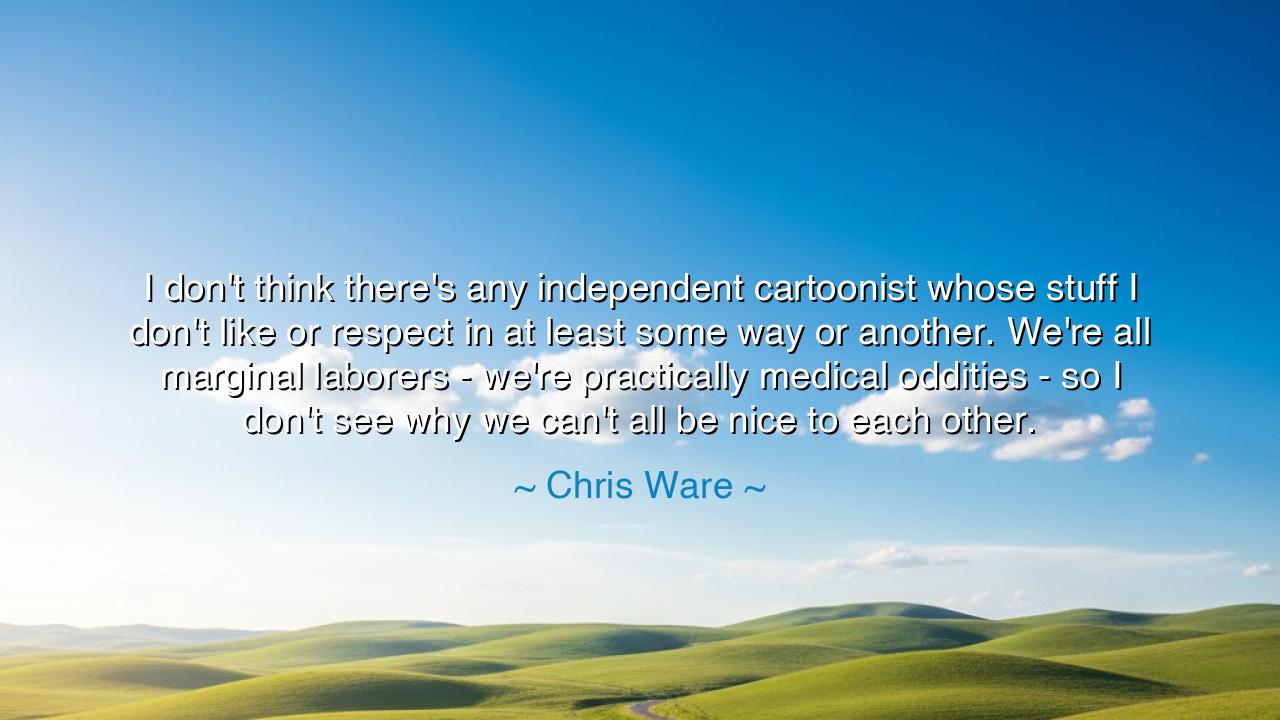
I don't think there's any independent cartoonist whose stuff I
I don't think there's any independent cartoonist whose stuff I don't like or respect in at least some way or another. We're all marginal laborers - we're practically medical oddities - so I don't see why we can't all be nice to each other.






Hearken to the words of Chris Ware, whose reflection bridges craft, humility, and human fellowship. He declares, “I don’t think there’s any independent cartoonist whose stuff I don’t like or respect in at least some way or another.” In these words lies an ancient truth: the recognition of merit in others, even amidst difference and diversity, cultivates harmony and mutual growth. Each artisan, though laboring in relative obscurity, contributes to the richness of the craft, and in honoring their efforts, we elevate not only them but the entire endeavor.
Since the earliest days of human society, those who practiced arts and crafts often labored at the margins, unheralded yet indispensable. In the workshops of Athens and Rome, sculptors, scribes, and painters created works that would inspire generations, yet many toiled without fame or fortune. Ware’s acknowledgment of fellow cartoonists as “marginal laborers” echoes this ancient understanding: the value of work does not depend solely on recognition, but on dedication, skill, and the courage to create in the face of adversity.
Consider the story of Giovanni Boccaccio, whose literary works flourished in the shadow of plagues and social upheaval. Though not universally celebrated in his own time, Boccaccio’s devotion to storytelling enriched the culture profoundly. Like Ware’s independent cartoonists, such creators labored in conditions of marginality, yet their contributions became foundational, illustrating the power of perseverance, mutual respect, and shared labor in the cultivation of culture.
Ware likens independent cartoonists to practically medical oddities, emphasizing their uniqueness and the unusual challenges of their labor. This metaphor highlights the vulnerability and peculiarity of dedicated artisans, who often exist outside mainstream support and recognition. Yet, even amid these challenges, Ware advocates for collegiality: “I don’t see why we can’t all be nice to each other.” This principle transcends craft—it is a moral precept, a reminder that empathy and kindness are as essential to human endeavor as talent and skill.
The reflection also underscores the value of solidarity among those who share a calling. In creative, intellectual, or even physical labor, practitioners often face isolation, marginalization, or misunderstanding. By honoring one another and respecting each person’s contribution, a community becomes resilient, supportive, and fertile for innovation. Ware’s ethos mirrors that of guilds in medieval Europe, where artisans, though working in humble and separate shops, fostered networks of mentorship, collaboration, and mutual respect that preserved knowledge and skill across generations.
The moral lesson emerges: respect for peers, especially those in challenging or unconventional work, strengthens both individual and collective achievement. Recognition need not be universal or absolute, but the acknowledgment of effort, creativity, and craft fosters goodwill and cooperation. Just as Ware honors the work of fellow cartoonists, so too should any practitioner—of art, science, or labor—value the dedication of others, even when paths diverge or methods differ.
Practical guidance flows naturally: cultivate humility, observe the labors of others attentively, and express genuine appreciation for their efforts. Resist envy, disdain, or condescension, for each artisan’s contribution enriches the broader tapestry of human endeavor. By fostering kindness and respect, the community becomes stronger, and the pursuit of craft more joyful and enduring.
Thus, heed the wisdom of Chris Ware: recognize the uniqueness of those who labor in the margins, honor their contributions, and extend goodwill freely. In celebrating the labor of others, we honor the spirit of creation itself, cultivate harmony, and strengthen the bonds that allow art, skill, and human endeavor to flourish across generations. Let respect, kindness, and empathy guide all who walk the path of creativity and labor.






AAdministratorAdministrator
Welcome, honored guests. Please leave a comment, we will respond soon